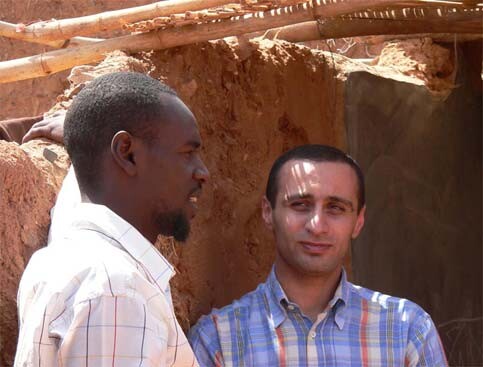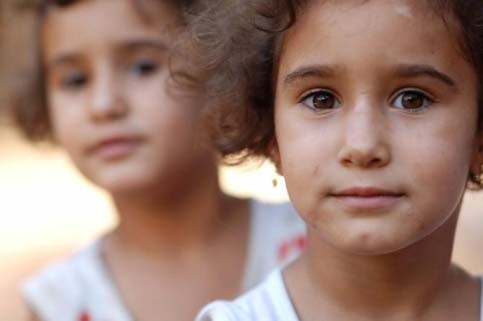Electronic Lebanon 11 August 2006

Where he more often can be found, Rabih Yazbeck (r) working in the field, in this instance with internally displaced people in Sudan. Now he is coordinating relief for Lebanon, his home country. (NEF)
News headlines took me back to the past — a dark, gloomy and depressing past that I have lived and survived: a 20-year Lebanese civil war, the 1982 full-scale Israeli invasion of Lebanon…1996…2000…and on and on….
However, this time it is different because I am watching it on television away from my family and friends. This time I am not staying in a shelter hearing the bombs outside and not knowing when a bomb will strike our house. This time I am outside the country, watching live coverage on the news and seeing photographs of people, injured or dead, displaced or in shelters. They could be someone I know well…photographs of unbearable pain…innocent souls caught in the middle of madness….
That woman lost in the streets of Beirut, saying she fled her home, sent her children to safety in the mountains, and is looking for her brother’s house. Resigned, she spoke with no anger. She had no luggage, nothing worth saving. She had no tears either. She kept repeating: “I don’t know where I am.”

NEF is providing psychological and social work assistance for those most in need as well as group activities and learning for parents and children suffering from trauma and distress. (NEF)
Photographs of charred bodies extracted from wreckage, little bodies of children consumed by flames. They were “grilled,” a doctor said. Children who thought they were running away to safety.
Seeing all these photographs on TV and in newspapers made me feel powerless, useless, unable to share the pain of these children and their families as I did for years, unable to alleviate their suffering.
However, this time I am part of the Near East Foundation team, the same international organization that worked in Lebanon at the time of the famine during World War I and fleeing of Armenian refugees trying to escape into Lebanon. For the first time in my career at NEF, I count myself as a relief worker responding to a crisis; AND a Lebanese national working to alleviate the suffering of the families and children of his own country. This time I am working for people I know well — they could even be my neighbors, my friends, my own family. This time I am not working for Iraq, Darfur, or the West Bank, but for my own country, for the country I saw rising from the ashes in the past five to 10 years. I feel now I am exactly in the right place allowing me to feel NOT useless and NOT hopeless.
Forgive me for not being able to write about anything else. Forgive me for writing with a personal touch. Allow me to show gratitude to the many supporters who responded to NEF’s appeal with their generous donations and/or their supportive words — and to NEF who allowed all of that.
Allow me to quote Lebanon’s greatest poet, Gibran Khalil Gibran — as others did recently, including Robert Fisk who moved to tears all those who read his mournful article for Beirut. Gibran wrote of the half million Lebanese who died in the 1916 famine:
“My people died of hunger, and he who
Did not perish from starvation was
Butchered with the sword
They perished from hunger
In a land rich with milk and honey
They died because the vipers
Sons of vipers spat out poison
The space where the Holy Cedars and
The roses and the jasmine breathe
Their fragrance.”
Allow me as well to quote this new graduate from the American University of Cairo, who emailed me: “Since I’m just a fresh graduate and can’t help Lebanon that much financially, I thought of emailing you to see if I can help any other way, even if it is by being on planes transferring aid to families in Lebanon. I’m donating myself, my power and my strength to Lebanon and the Lebanese people,” she said.
Allow me to quote one of our many NEF donors who responded generously to our emergency appeal: “Please know how much I support the work of NEF and all of you working quietly to make things better. I am broken hearted about what is going on in Lebanon.”
As a Lebanese national, as NEF staff, and as the NEF Relief Mission Coordinator to Lebanon, I want to say THANK YOU.
Rabih Yazbeck is the Near East Foundation Coordinator of Emergency Lebanese Relief, based in Amman, Jordan.
Related Links

